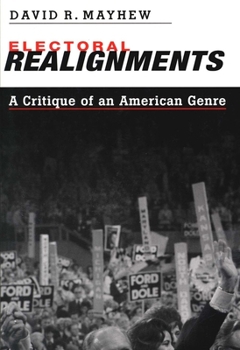Electoral Realignments: A Critique of an American Genre
(Part of the The Institution for Social and Policy Studies Series)
Select Format
Select Condition 
Book Overview
The study of electoral realignments is one of the most influential and intellectually stimulating enterprises undertaken by American political scientists. Realignment theory has been seen as a science able to predict changes, and generations of students, journalists, pundits, and political scientists have been trained to be on the lookout for "signs" of new electoral realignments. Now a major political scientist argues that the essential claims of realignment theory are wrong-that American elections, parties, and policymaking are not (and never were) reconfigured according to the realignment calendar. David Mayhew examines fifteen key empirical claims of realignment theory in detail and shows us why each in turn does not hold up under scrutiny. It is time, he insists, to open the field to new ideas. We might, for example, adopt a more nominalistic, skeptical way of thinking about American elections that highlights contingency, short-term election strategies, and valence issues. Or we might examine such broad topics as bellicosity in early American history, or racial questions in much of our electoral history. But we must move on from an old orthodoxy and failed model of illumination.
Format:Paperback
Language:English
ISBN:0300093659
ISBN13:9780300093650
Release Date:May 2004
Publisher:Yale University Press
Length:174 Pages
Weight:0.50 lbs.
Dimensions:0.5" x 5.5" x 8.3"
Customer Reviews
1 rating
Its time to update your course reading lists
Published by Thriftbooks.com User , 21 years ago
Mayhew offers a much needed critiqe of this the realignment literature. Many of us were subject to great works of Key, Burnham, E.E.S., Sundquist, ect... and Mayhew challenges each of their theories piece by piece. A monumental work challenges others to take up the great task of creating a new method to think of partisan change.





